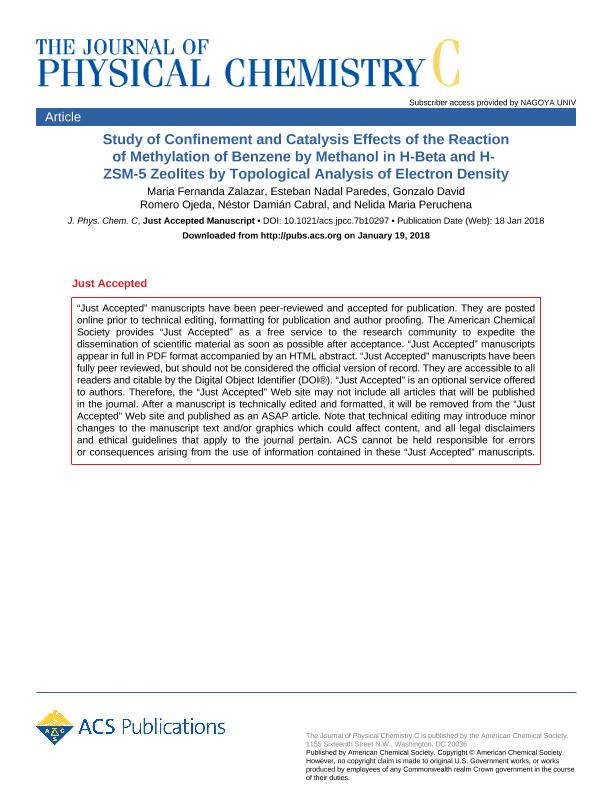Mostrar el registro sencillo del ítem
dc.contributor.author
Zalazar, Maria Fernanda

dc.contributor.author
Paredes, Esteban Nadal

dc.contributor.author
Romero, Gonzalo David

dc.contributor.author
Cabral, Néstor Damián

dc.contributor.author
Peruchena, Nelida Maria

dc.date.available
2020-01-29T21:56:49Z
dc.date.issued
2018-02
dc.identifier.citation
Zalazar, Maria Fernanda; Paredes, Esteban Nadal; Romero, Gonzalo David; Cabral, Néstor Damián; Peruchena, Nelida Maria; Study of Confinement and Catalysis Effects of the Reaction of Methylation of Benzene by Methanol in H-Beta and H-ZSM-5 Zeolites by Topological Analysis of Electron Density; American Chemical Society; Journal of Physical Chemistry C; 122; 6; 2-2018; 3350-3362
dc.identifier.issn
1932-7447
dc.identifier.uri
http://hdl.handle.net/11336/96193
dc.description.abstract
In this work we studied the host-guest interactions between confined molecules and zeolites and their relationship with the energies involved in the reaction of methylation of benzene by methanol in H-ZSM-5 and H-Beta zeolites employing density functional theory (DFT) methods and the quantum theory of atoms in molecules. Results show that the strength of the interactions related to adsorption and coadsorption processes is higher in the catalyst with the larger cavity; however, the confinement effects are higher in the smaller zeolite, explaining, from an electronic viewpoint, the reason why the stabilization energy is higher in H-ZSM-5 than in H-Beta. The confinement effects of the catalyst on the confined species for methanol adsorption, benzene coadsorption, and the formed intermediates dominate this stabilization. For the transition state (TS), the stability of the TS is achieved due to the stabilizing effect of the surrounding zeolite framework on the formed carbocationic species (CH3+) which is higher in H-ZSM-5 than in H-Beta. In both TSs the methyl cation is multicoordinated forming the following H2O···CH3+···CB concerted bonds. It is demonstrated that, through the electron density analysis, the criteria can be defined to discriminate between interactions related to the confinement effects and the reaction itself (adsorption, coadsorption, and bond-breaking and bond-forming processes) and, thus, to discriminate the relative contributions of the degree of confinement to the reaction energies for two zeolite catalysts with different topologies.
dc.format
application/pdf
dc.language.iso
eng
dc.publisher
American Chemical Society

dc.rights
info:eu-repo/semantics/openAccess
dc.rights.uri
https://creativecommons.org/licenses/by/2.5/ar/
dc.subject
HETEROGENEOUS CATALYSIS
dc.subject
CARBENIUM IONS
dc.subject
HOST-GUEST INTERACTIONS
dc.subject
DFT
dc.subject
QUANTUM THEORY OF ATOMS IN MOLECULES
dc.subject.classification
Físico-Química, Ciencia de los Polímeros, Electroquímica

dc.subject.classification
Ciencias Químicas

dc.subject.classification
CIENCIAS NATURALES Y EXACTAS

dc.subject.classification
Química Orgánica

dc.subject.classification
Ciencias Químicas

dc.subject.classification
CIENCIAS NATURALES Y EXACTAS

dc.subject.classification
Otras Ciencias Químicas

dc.subject.classification
Ciencias Químicas

dc.subject.classification
CIENCIAS NATURALES Y EXACTAS

dc.title
Study of Confinement and Catalysis Effects of the Reaction of Methylation of Benzene by Methanol in H-Beta and H-ZSM-5 Zeolites by Topological Analysis of Electron Density
dc.type
info:eu-repo/semantics/article
dc.type
info:ar-repo/semantics/artículo
dc.type
info:eu-repo/semantics/publishedVersion
dc.date.updated
2019-10-22T17:41:14Z
dc.journal.volume
122
dc.journal.number
6
dc.journal.pagination
3350-3362
dc.journal.pais
Estados Unidos

dc.journal.ciudad
Washington DC
dc.description.fil
Fil: Zalazar, Maria Fernanda. Consejo Nacional de Investigaciones Científicas y Técnicas. Centro Científico Tecnológico Conicet - Nordeste. Instituto de Química Básica y Aplicada del Nordeste Argentino. Universidad Nacional del Nordeste. Facultad de Ciencias Exactas Naturales y Agrimensura. Instituto de Química Básica y Aplicada del Nordeste Argentino; Argentina
dc.description.fil
Fil: Paredes, Esteban Nadal. Universidad Nacional del Nordeste. Facultad de Ciencias Exactas y Naturales y Agrimensura. Departamento de Química. Laboratorio de Estructura Molecular y Propiedades; Argentina. Consejo Nacional de Investigaciones Científicas y Técnicas. Centro Científico Tecnológico Conicet - Nordeste; Argentina
dc.description.fil
Fil: Romero, Gonzalo David. Consejo Nacional de Investigaciones Científicas y Técnicas. Centro Científico Tecnológico Conicet - Nordeste; Argentina. Universidad Nacional del Nordeste. Facultad de Ciencias Exactas y Naturales y Agrimensura. Departamento de Química. Laboratorio de Estructura Molecular y Propiedades; Argentina
dc.description.fil
Fil: Cabral, Néstor Damián. Universidad Nacional del Nordeste. Facultad de Ciencias Exactas y Naturales y Agrimensura. Departamento de Química. Laboratorio de Estructura Molecular y Propiedades; Argentina
dc.description.fil
Fil: Peruchena, Nelida Maria. Consejo Nacional de Investigaciones Científicas y Técnicas. Centro Científico Tecnológico Conicet - Nordeste. Instituto de Química Básica y Aplicada del Nordeste Argentino. Universidad Nacional del Nordeste. Facultad de Ciencias Exactas Naturales y Agrimensura. Instituto de Química Básica y Aplicada del Nordeste Argentino; Argentina
dc.journal.title
Journal of Physical Chemistry C

dc.relation.alternativeid
info:eu-repo/semantics/altIdentifier/url/http://pubs.acs.org/doi/10.1021/acs.jpcc.7b10297
dc.relation.alternativeid
info:eu-repo/semantics/altIdentifier/doi/https://doi.org/10.1021/acs.jpcc.7b10297
Archivos asociados
